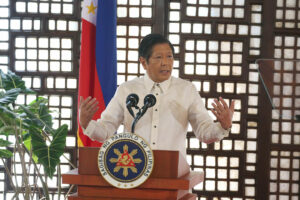Marcos pushes joint South China Sea oil drilling as Malampaya runs out

By Kyle Aristophere T. Atienza, Reporter
PRESIDENT Ferdinand R. Marcos, Jr. has cited the need to resolve “issues” in the South China Sea so that the Philippines could start joint exploration for gas and oil in the waterway before the depletion of the Malampaya gas field.
Speaking in Japan where he is attending a regional summit, Mr. Marcos expressed concern over increasing tensions in the South China Sea which he said have “increased rather than diminished” in recent months.
The Reed Bank, which falls well within the Philippine exclusive economic zone (EEZ) northeast of the Spratly Islands, is believed to hold up to 5.4 billion barrels of oil and 55.1 trillion cubic feet of natural gas.
The supply of liquified natural gas (LNG) has become “more important to the Philippines, particularly as it transitions to renewable energy,” Mr. Marcos said.
But he acknowledged that very little progress has been made since the country started negotiating with China for joint oil and gas exploration.
“We are still at a deadlock right now. It is in a conflict area. So, that’s another thing that we have to try and resolve to see what role any countries play,” he said.
“It’s still of course the position of the Philippines that this is not in a conflict area,” he said, stressing that the area being referred to “is very clearly within our exclusive economic zone.”
“[It is] within our baselines, within the maritime territory, the Philippines,” the President added.
In April, Foreign Affairs Secretary Enrique A. Manalo said the Philippines and China were set to hold “preparatory talks” in May on joint oil and gas exploration in the South China Sea, despite a Philippine Supreme Court ruling declaring that such an activity is unconstitutional.
The High Court ruled in January that the 2005 agreement for joint oil and gas exploration among the Philippines, China, and Vietnam was unconstitutional because it allowed foreign corporations to exploit natural resources belonging to the Filipino people.
As the energy landscape sees a global transition to cleaner fuel to meet carbon emission targets, the Philippines takes particular interest in LNG.
“We are seeing LNG as being the transition between purely fossil fuel, coal, to the more, bigger mix of renewables,” Mr. Marcos said, noting that his government’s push for a transition to renewable energy has not been easy “as we had hoped.”
“And so, we need a transition period to give ourselves time to bring the infrastructure and to allow the technologies to develop,” he added.
The Malampaya project, the country’s sole natural gas provider, is expected to be depleted by 2027.
The exploration of Recto Bank was put on hold in 2012 following an order from the late Benigno S. Aquino, III freezing all exploration activities in South China Sea areas belonging to the Philippines amid rising tensions with Beijing.
But his successor, Rodrigo R. Duterte, lifted the suspension in 2020, resuming drilling activities in the disputed waters, including the Reed Bank, and advancing a 2018 deal with China for joint oil and gas exploration.
In April last year, the Duterte administration suspended all local exploration activities in the disputed areas in the West Philippine Sea, effectively stopping the survey activities of local companies at two sites at Reed Bank.
The government said the decision was made because “under international law, a geophysical survey is perfectly legitimate activity in any disputed area.”
This was followed by an announcement in June 2022 that formal Philippine-China talks over joint energy exploration that began in 2018 had been terminated, with Manila’s foreign affairs agency citing constitutional constraints and issues of sovereignty.
Former Supreme Court justice Antonio T. Carpio has been leading the chorus of calls for the Philippines to start drilling for oil and gas at Reed Bank, asking the Marcos administration to conduct joint patrols with the United States and seek the help of the Philippine Navy when it launches exploration activities.




